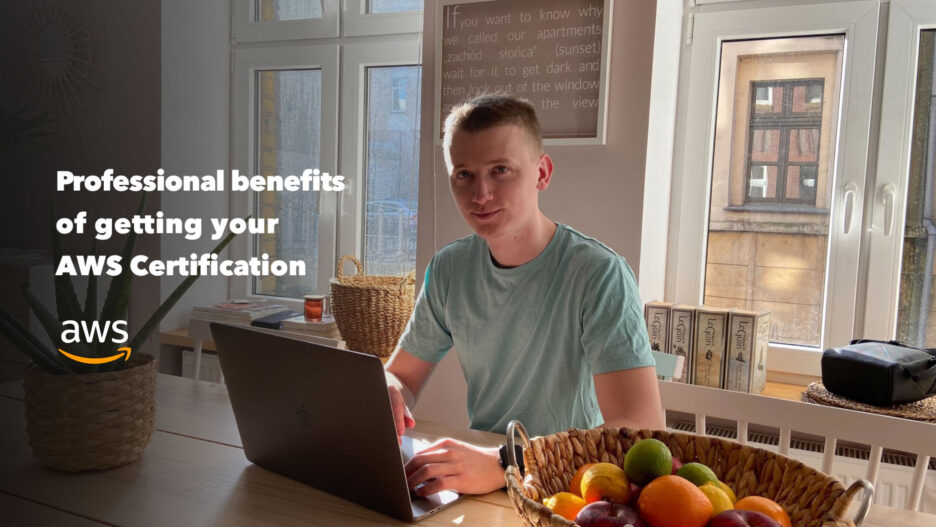Greetings, everyone! My name is Dmytro Bavykin and I am a Senior Software Engineer at Svitla Systems.
For over 5 years, I’ve been working in the IT industry and I’m always in search of exciting, challenging, and interesting projects that help me level up my software engineering skills. Some time ago, I heard about the AWS certification from a few friends of mine and did a little research of my own to see which AWS certification should I get and if the program suited me so I could start to prepare for AWS certification.
Spoiler alert, I did get the AWS certification and it was a pretty good and thoughtful decision to make progress in my professional career.
In this post, I want to share my AWS certification path experience of choosing an AWS certification exam, preparing for it, the AWS certification costs that come with it, and how to make the best of the experience with quarantine protocols in full swing almost everywhere in the world.
What is an AWS certification?
The AWS certification is a credential that validates your knowledge, skills, and abilities on the cloud as deemed by the issuer, Amazon Web Services.
For me, the certification also sets the bar for cloud expertise and describes you as a well-disciplined, goal-oriented professional who wishes to learn new things about the cloud. If you’re hesitant about what to learn next, you can’t go wrong with AWS. But beware, some of you may never return to coding and decide to pursue CloudOps roles going forward.
What knowledge can you gain from a cloud AWS certification?
With several years under its wing, the AWS certification is structured educational material set out to both instruct and determine how skilled you are in various areas of the cloud. The material is mostly geared to help you clean useful insights and skills that you could then apply in your day-to-day to make your engineering routine awesome.

For instance, you could optimize application performance, check its readiness for a disaster and improve availability, and much, much more, with everything you’ll get out of taking the AWS certification. Sometimes, you could save yourself a lot of headaches by understanding that the cloud has already solved your problem, leaving you to focus on end-product strategic tasks.
Before taking the AWS certification, I was completely unaware of how many unusual and interesting services AWS has to offer. Looking to create your own private blockchain, Ethereum-based network? You can use AWS Managed Blockchain. Tired of having to buy new iPhones to test your app with the latest versions of the device? AWS offers you Device Farm so you simulate different devices for testing purposes. Interested in sending 100 petabytes of data from your on-premises infrastructure to the cloud? You could request a Snowmobile! In all honesty, a Snowmobile is worth requesting just for fun :)
AWS equips your company with all the needed capabilities to become an AWS partner via the AWS Partner Network. AWS is interested in certified and trained individuals that can help them improve the customer experience.
Would it be better to try passing the AWS Certification Solution Architect or AWS Certification Developer Associate instead of Cloud Certified Practitioner (CCP) to save time and money?
I think it’d be helpful to put things in perspective. If you were new at a gym, would you go straight for the biggest weight you can find and try to lift it on your first visit? I would hope your trainer would stop you from even attempting such a thing on the first day because it could seriously injure you, and maybe even demoralize you. Well, the same logic applies to choosing the right AWS certification.
My recommendation is that you take things step by step and go easy on yourself. I believe what truly matters is the quality of your gained knowledge and that you give it some time and space to settle in.
If you start with one of the entry-level certifications, it would make it easier for you to take a higher-level certification as you would already be acquainted with the exam procedure and structure, the way questions are asked, and what you should focus on, giving you the confidence to know what to expect and be less anxious during next exams.
Now, let’s comprare the cost of AWS certification. The AWS Certification Associate Developer costs $150 at the time of writing the article. The AWS CCP certification costs $100. But, after passing the exam you would become a member of the AWS community which gives you access to some cool perks like discounts for future certifications.
For example, you could use your personal 50%, so it results in 100 + 75 = $175 USD. I think 25 dollars over is worth it, but everyone should choose the most applicable option for themselves.
Also, please consider that some companies compensate their employees for certifications they take that are within budget. Also, keep in mind that this is an investment in your future!
If you take any steps, big or small, it does not matter, the point is that you’re moving forward. Your brain is constantly exercised and you save your expertise from being overloaded or stagnant because if you’re not learning anything new, your knowledge slowly becomes outdated.
I hope my experience motivates you to start preparing for your AWS certification. Now, let’s discuss resources I found and used in preparation of the exam, which I hope will be helpful for you too!
Resources for preparing
Before officially taking the AWS certification, I had seen a similar course on sale at Udemy. The course seemed familiar because I had already taken part in a small learning group with friends as a means to incite some friendly competitive behavior and to prepare ourselves for the certification. I took the leap and signed up for the Udemy course prior to the actual AWS certification.
The most helpful and impactful course for me was imparted by Stepan Maarek → https://www.udemy.com/course/aws-certified-cloud-practitioner-new/, which includes one test exam which is pretty helpful.
Another thing that I would highly recommend is that you practice as much as possible. AWS Certification test exams helped me build an exam-oriented mindset, and here’s one you can use → https://www.udemy.com/course/practice-exams-aws-certified-cloud-practitioner/.
In total, I paid $20 which was a pretty good deal since regular price amounted to $80 for each. I also encourage you to go ahead and check out the course author’s LinkedIn page because they regularly gift discount coupons for their courses. Some authors offer a 30 day “no questions asked” money back guarantee, so why not go ahead and give it a go?
Be sure to leverage AWS resources. There is enough free guidance, instructions and videos in there to help you get started, study, and train → https://aws.amazon.com/certification/certified-cloud-practitioner/. As for me, I checked a few free tests and watched a few recorded Twitch streams. I enjoyed the opportunity of watching the same material imparted by different mentors because sometimes you understand new information better from another speaker.

I had some practice on AWS. AWS offers a 1-year free tier if you are a new user. Free tier does not cover every service, but you will have some free quotas for a lot of services. You can read more about it here. I’ve had my account for years, so I didn't have free tier while preparing, and after using a few services, my bill amounted to only $0.13 in total.
If you wanna shadow my steps, I did it in such order
- Watch a Udemy course as training for AWS certification
- Try to pass the test exam inside the Udemy course
- Review your exam and replay the parts you failed during the exam
- Complete the test exams from the practice set
- Go back again to review your exam and replay the parts you had a hard time addressing during the exam
- Strive for an average score in all tests of at least 85% because the certification requires at least 70% to pass
- Explore the free AWS resources and check current rules of passing the certification. Rules are shown in the course, but I found a difference between what was shown and what actually took place. The exam consists of 65 questions, but only 50 of those questions affect your score, and 15 questions are used to collect data for AWS needs. You can learn more about it here.
How to register for your first AWS certification
When you are ready enough, the next step is to register for the actual certification. You need an Amazon account for it, not an AWS account →https://www.aws.training/certification.
Once registered, you have two options: To take the certification online or offline due to COVID. In my case, I did not want to wait 2 weeks for the closest available offline date, so I chose Pearson VUE online. I suggest that you read the rules of passing the online certification very carefully at least twice as some rules contradict themselves. Keep in mind that your working space can’t have anything that could consist of information. Food, wearable devices, headphones—also forbidden.
Check the documents you need to have with you to verify your identity, make a system test of your laptop/PC, and ensure you’re the only person in the room during the entire certification. Keep in mind that your PC can be tracked to check you are not cheating.
Thirty minutes before the exam, I started the check-in process, made photos of my identity documents, and of my working space from different angles. Next, I ran a system check to check sound, video, bandwidth, and running processes. After having gone through all those checks, I was put on queue. My proctor, who would be watching my entire certification, joined and asked me to show my working space using a webcam. Then, I was politely asked to show my hands and wrists, and I’ve heard that people with long hair are sometimes needed to show their ears.
And so, the journey began. After answering a few questions, I had a chance to fail and my exam might be revoked. I got a warning from my proctor for MUMBLING. I think I was too concentrated and started moving my lips while reading questions. I suppose it could look suspicious. I did not try to argue, I said sorry to my proctor, and pursed my lips.
You have 100 minutes to pass the certification and I used 40, so I had plenty of time to review my questions, but I had a gut feeling that everything was fine and just clicked “Finish”. You can see the overall status of whether you passed or fail, and then it takes up to 5 business days to send you a full report. I got it on the next day. You need 700 points from 1000 to pass the exam, and the exam evaluates between 100 to 1000. My score was 882, which I was pretty satisfied with. Last but not least, after receiving a full report of your score, you can link your AWS badge to your LinkedIn account and start preparing for the next level.
Conclusion
It took me about 6 weeks from buying the first Udemy course to actually adding the AWS certification to my LinkedIn account. In my first Udemy course, I failed with a 69% score, but I kept reading, studying, taking test exams, and learning more and more from different sources until my score was 90% in my trials
I suggest that you take it easy on yourself and don’t look for perfection. Prepare yourself to gain confidence as even people with vast cloud experience can make mistakes at an exam.
I spent $20 in Udemy courses, $100 for the AWS CCP registration, and 0.13$ for AWS services I used while preparing, so in total, it was $120.13 dollars for me. Now, I feel more confident about my AWS knowledge and have a weird urge to fit every one of my needs with one of the solutions that AWS offers. What’s next? I think there’s little time for hesitation, so that’s why I already started preparing for my AWS Developer Associate certification.






